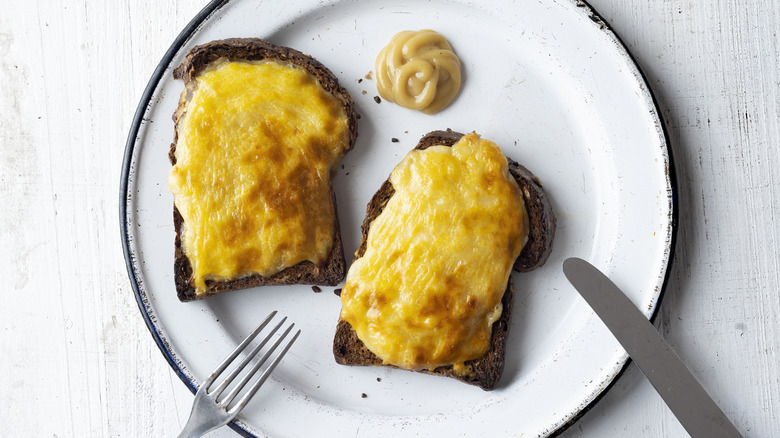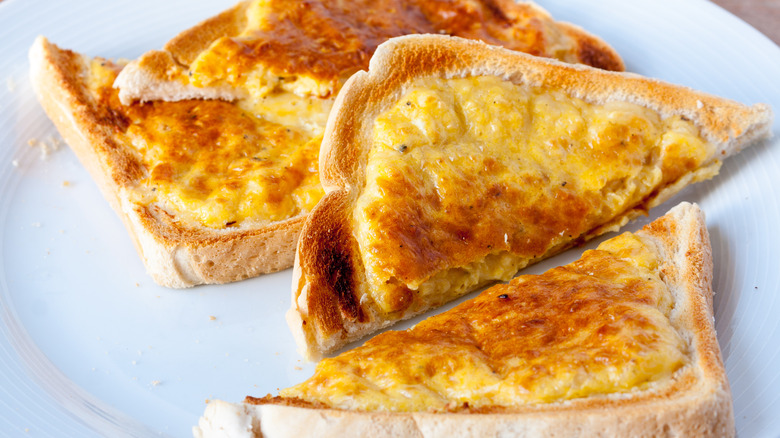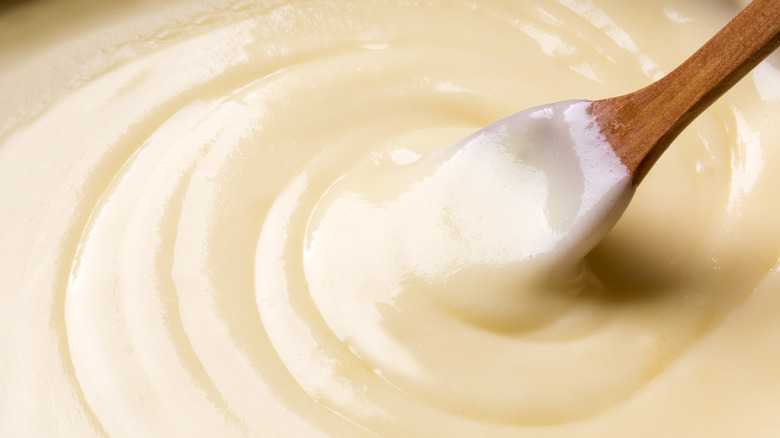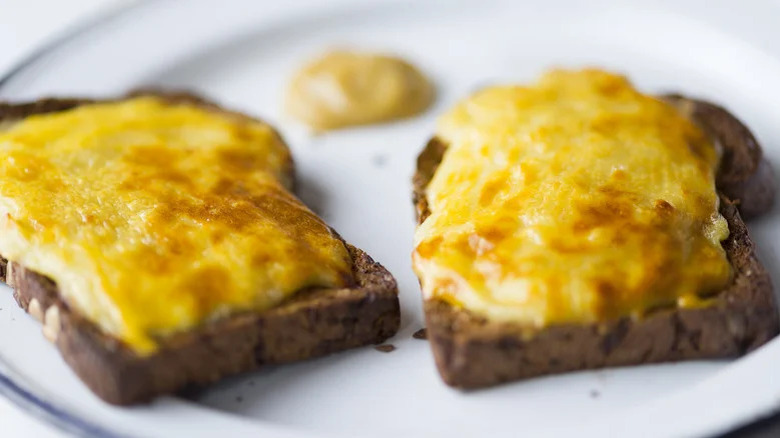What Is Welsh Rarebit And Is It Vegetarian?
If Americans have their mac and cheese, the Welsh have their caws pobi, which they have enjoyed for hundreds of years. The traditional Welsh dish is fairly simple to make — cheese is first melted in a pot, and then poured over bread before it is served. If that sounds remarkably like a dish we know as Welsh rarebit, that's because caws pobi is credited as being the antecedent to what now is arguably the country's best-known dish.
Rarebit is as Welsh as it gets today. It even has its own national day, which is marked on September 3. And while it would be easy to think of Welsh rarebit as just another variation on British cheese on toast, which involves toasting bread and then throwing cheese on top before grilling, Welsh rarebit is more than that. With an ingredient list that includes cheese, beer, and a blend of flavors that come from mustard and Worcestershire sauce, we can see why Alton Brown describes the dish as a "rich beer cheese fondue" and "cheesy comfort food as its simplest."
History of Welsh rarebit
While Wales is happy to claim rarebit as its own, there are those that say the dish doesn't actually come from the country but has its roots next door in England, where the English once used "Welsh" to describe something of inferior quality. It is even suggested that it was called "rabbit" because the Welsh were so poor they couldn't afford meat.
And while it might have started out as an insult, the name "rabbit" hung around until it was dubbed "rarebit" in a cookbook published years later. There is speculation that the name change might have been triggered by a desire to get rid of whatever pejorative the original name might have carried, but even that theory has not been verified, and both names — Welsh rabbit and Welsh rarebit are used today, You're most likely to see Welsh rarebit served at pubs across the British Isles.
How Welsh rarebit is made
Even though recipe quantities might vary, the ingredients for Welsh rarebit are very similar — butter, flour, mustard, Worcestershire sauce, dark beer or Guinness, chili or hot sauce, handfuls of English or Welsh cheese, as well as bread. In a pinch and if you don't have access to British cheese, semi-hard cheeses like gruyére will also do. And while there is just one Welsh rarebit, there are different ways of making it.
One recipe calls for a roux to be made with butter and flour, which is cooked until golden brown before other ingredients are added. The other method dispenses with the roux and sees all but the beer tossed into a pan to combine before the beer is then added. Once the cheese is thoroughly melted and mixed, what happens next depends on who you ask. While some recommend simply pouring the cheese on thick cuts of toast, others suggest putting your cheese-soaked bread under the broiler and waiting until it bubbles.
Why Welsh rarebit isn't vegetarian
While Welsh rarebit might sound like a vegetarian meal option, it isn't, and that's thanks to the presence of a critical ingredient found in all iterations of regular rarebit — Worcestershire sauce, which is made with anchovy. But there is still a way to make the dish vegetarian if you might want to leave off the iconic condiment altogether. Another way to make this dish vegetarian is to swap the sauce for mushroom ketchup.
But if you're vegetarian and you're really committed to the idea of making this dish as close to the real thing as possible, you might want to make your own vegan Worcestershire sauce blend, where you'll need soy sauce, maple syrup, apple cider vinegar, onion powder, garlic powder, cinnamon, as well as ground black pepper, per Loving it Vegan. You can also make the entire meal vegan by swapping out all the meat products — a roux can be made with olive oil or margarine instead of butter, and you'll want to use vegan cheese instead of British cheddar.
Non-vegetarian variations on the original Welsh rarebit
While there is nothing like the original Welsh rarebit, it should come as no surprise that variations to suit different palates have emerged. There is English Rarebit, which is made with wine instead of beer, which not everyone appears to be too enthused about. There's also Buck rarebit, which calls for the cheesy toast to be topped with an egg, fried or poached. Wales Guidebook also offers other variations on Welsh rarebit. It proposes you can make the dish alcohol-free by subbing the beer with extra milk.
For those who might want to cut down on their gluten intake, the site suggests subbing the flour in the roux with gluten-free flour, and for the use of gluten-free bread in place of a regular piece of toast. If you're a committed carnivore, you can change up the way you serve Welsh rarebit by adding nduja to the toast before adding cheese; using bacon to add a smoky pork flavor; or even using a bit of ham, turning what might be a snack or a light meal into something truly substantial.




